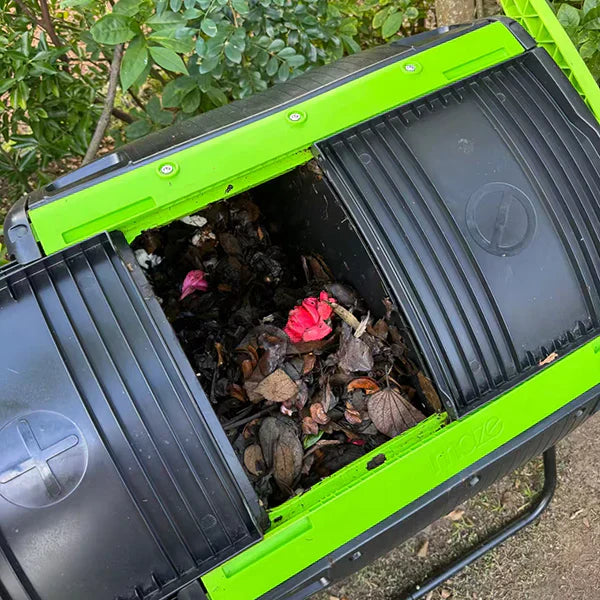
My First Home Composting Fail: Lessons Learned and How an Electric Composter Saved the Day 💔
Share
When I decided to try home composting for the first time, I was super excited. Who doesn't love the idea of reducing waste and helping the planet? 🌍💚 I spent hours reading articles and watching videos, feeling way too confident. 😊 I headed to Bunnings, grabbed a new drum composter, and planned it out: 2 parts brown (carbon-rich) materials like fallen leaves and dried flowers, to 1 part green (nitrogen-rich) waste like veggie scraps and fruit peels. I'd been saving kitchen scraps for weeks! I filled the bin, dreaming of rich compost ready in a month for my blooming garden.
But a month later... nothing. 😞 Instead of breaking down, my bin became a fly-infested nightmare! 🪰 Every time I opened the lid, it was a stinky mess buzzing with pests. Disgusted and defeated, I almost gave up on composting altogether.
Why My Home Composting Attempt Failed: A Rookie's Breakdown 😌
In hindsight, I made several classic beginner mistakes. Composting isn't just about dumping stuff in a bin—it's a science involving balance, air, moisture, and temperature. According to the EPA's composting guide, getting these right is key to success. Here's a quick summary of my errors and how to avoid them:
|
Failure Factor |
My Mistake |
How to Fix It |
|
Balance of Ingredients |
I likely got the 2:1 brown-to-green ratio wrong—too much brown slowed decomposition, or too little green caused stagnation. |
Stick to the 2:1 ratio and mix well. Add EM microorganisms for a boost—they're beneficial bacteria and fungi that speed up breakdown. |
|
Air Circulation |
I didn't turn the compost often enough, leading to anaerobic conditions (no oxygen), foul smells, and slow progress. 😷 |
Aerate weekly by turning the pile. For easier options, consider tools that automate this. |
|
Moisture Levels |
I ignored moisture—my pile was probably too wet or dry, halting decomposition. |
Keep it like a wrung-out sponge. Monitor and adjust with water or dry materials as needed. |
|
Temperature |
No thermometer meant I couldn't track the ideal 135-160°F range; bacteria died off in the wrong temps. |
Use a compost thermometer and place the bin in a sunny spot. Electric models control this automatically. |
These issues turned my eco-dream into a disaster. But don't worry—I've learned, and you can too!
The Magic of EM Microorganisms: A Game-Changer? 🌱
After more research, I discovered Effective Microorganisms (EM)—a mix of beneficial bacteria, fungi, and actinomycetes that accelerate composting, reduce odors, and even deter pests. EM technology is backed by science and used by gardeners worldwide. I grabbed a starter pack from Bunnings and added it to my bin. It helped a bit, but results weren't instant. EM is great, but it still requires consistent care like regular turning and monitoring. 🧑🌾 If you're patient, it's a solid natural boost for traditional composting.
Electric Composters to the Rescue: My High-Tech Fix ⚡
I wasn't ready to quit composting, so I explored easier alternatives. That's when I found electric composters—like the ones from Moreborn Composter—which changed everything! 🌟
These devices speed up the process dramatically, turning food scraps into compost in just 48 hours (with added microbes). No more waiting months! They automatically control temperature, moisture, and aeration for optimal conditions. Our 4L compact model is perfect for small kitchens: super quiet, odor-free thanks to advanced filters, and it handles veggie peels, fruit scraps, coffee grounds, and even small bones. Plus, no messy turning required—it's low-maintenance and pest-proof.
The best part? It produces nutrient-rich, garden-ready compost without the hassle. If you're a busy beginner like me, an electric composter makes sustainable living effortless. Check out our 12L model for larger households too!
FAQ: Common Questions About Home Composting and Electric Solutions
Q1: Why did my traditional compost fail?
A1: Common issues include imbalanced materials, poor aeration, wrong moisture, or temperature fluctuations. Start with the basics and consider EM microbes for help.
Q2: What are EM microorganisms, and do they really work?
A2: EM are beneficial microbes that speed decomposition and cut odors. Yes, they work well in balanced piles—learn more here.
Q3: Why use an electric composter over traditional methods?
A3: It’s faster (weeks vs. months), low-maintenance, odor-free, and pest-resistant. Ideal for apartments or busy folks reducing landfill waste.
Q4: Can I compost kitchen scraps in an electric composter?
A4: Absolutely! Most handle veggie peels, fruit skins, coffee grounds, eggshells, and small bones. Avoid large meats or oils.
Q5: How long does an electric composter take?
A5: Models like ours finish in 48 hours with microbes, or 2-4 weeks for full cycles—way quicker than traditional methods.
Q6: Is electric composting eco-friendly?
A6: Yes! It diverts organic waste from landfills, reduces methane emissions, and creates natural fertilizer, cutting chemical use. EPA stats show composting cuts waste by 30%.
Q7: How much does an electric composter cost to run?
A7: Low energy use (like a lightbulb) and affordable filters (around $10 each, lasting 3 months). No hidden subscriptions!
Q8: Where can I buy a reliable electric composter?
A8: Start with Moreborn Composter—we offer compact and mid-size options with free shipping on first orders.
Final Thoughts: Don't Give Up on Composting! ⚡🌱
Composting can be rewarding, but starting simple is key. Whether boosting traditional methods with EM or going high-tech with an electric composter, patience and the right tools make all the difference. I've turned my fail into a success—now my garden thrives with homemade fertilizer! 💚
Ready to try? Shop our electric composters today and join the zero-waste movement. Share your composting story in the comments below—what's your biggest fail or win? Tag us on social with #CompostingFail or #MorebornComposter for a chance to be featured. Subscribe to our newsletter for free tips and exclusive discounts!
Happy composting! 🌿
Leave a Comment
Your thoughts? Comments are moderated for quality—share away!

